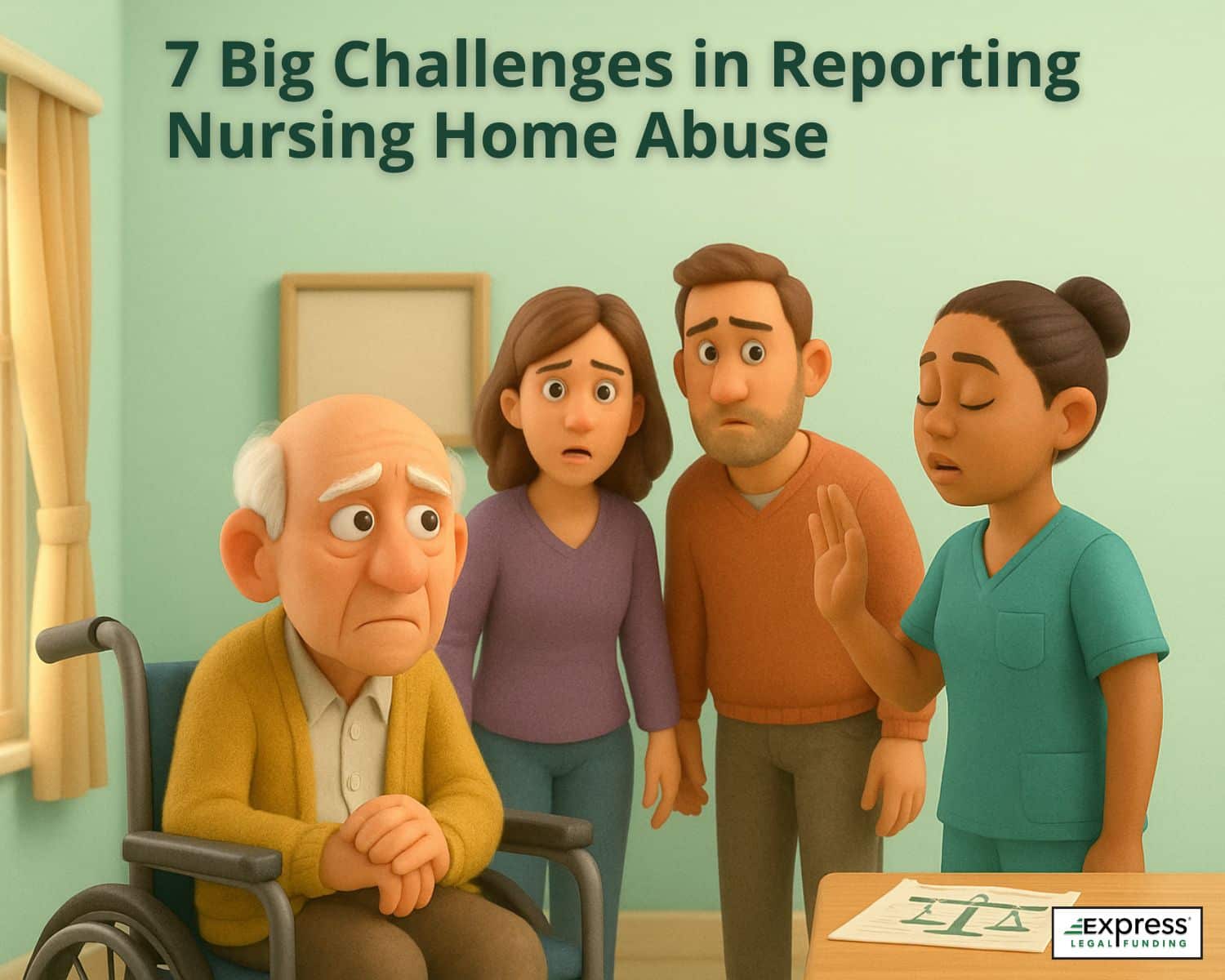
Nursing home abuse and neglect are tragically more common than many realize. While laws and reporting systems exist to protect elderly residents, a disturbing number of abuse cases continue to go unreported—leaving vulnerable individuals without the justice, safety, or care they deserve.
Reporting abuse isn’t just a legal necessity—it’s a lifeline. Yet families and victims often encounter serious obstacles when trying to speak up. From fear of retaliation to cognitive decline, from confusing procedures to institutional cover-ups, the barriers are numerous and deeply entrenched within the long-term care system.
The hidden nature of this mistreatment doesn’t just affect individual victims—it points to broader systemic failures in elder care. Understanding these failures is essential to driving reform and holding facilities accountable.
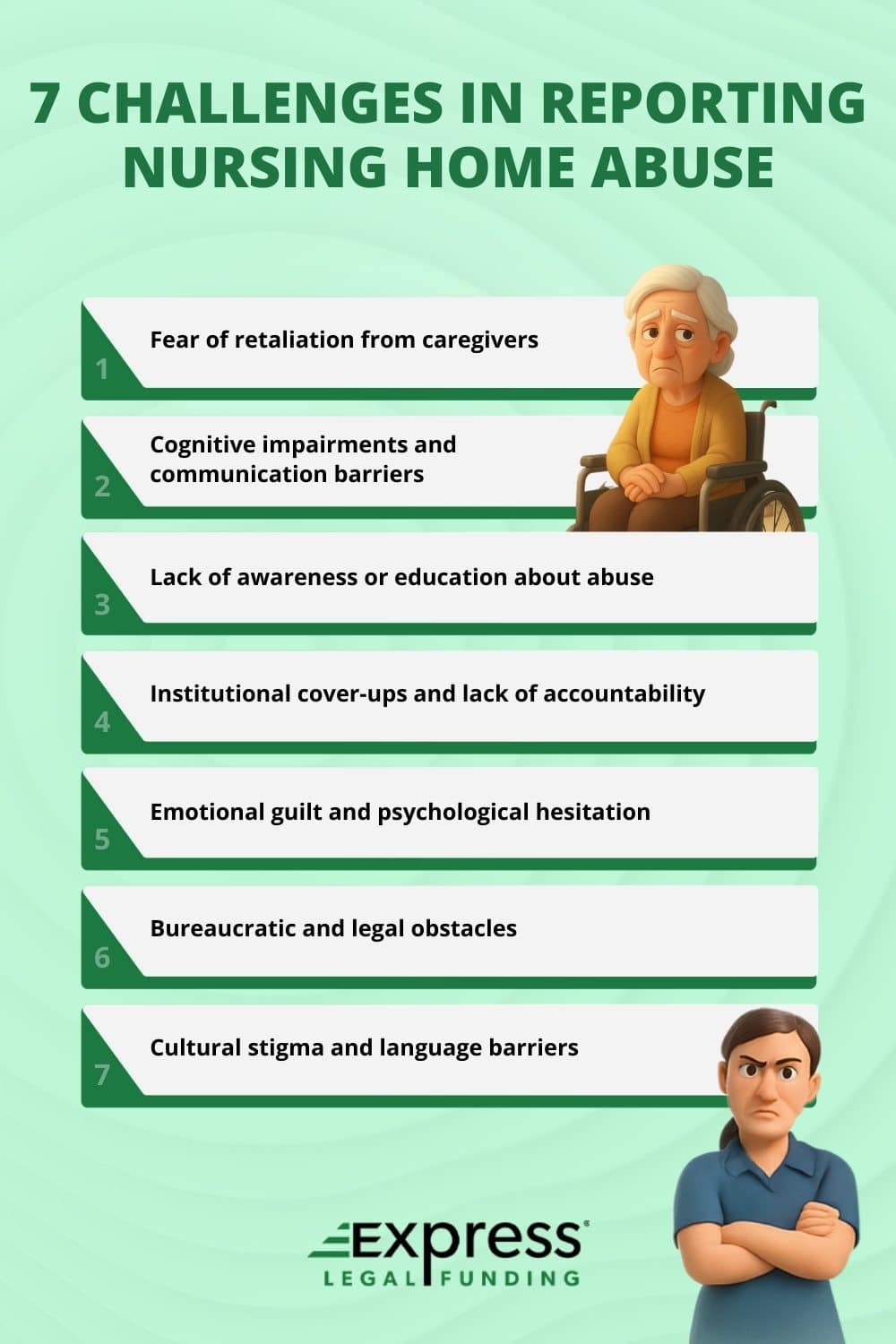
This article breaks down seven major challenges that prevent nursing home abuse from being reported. Backed by real-life case examples and practical solutions, our goal is to empower families, caregivers, and advocates to speak out, take action, and push for a more transparent and accountable elder care system.
Although the Elder Justice Act (42 U.S.C. § 1397j) was enacted to prevent elder abuse in long-term care facilities, its enforcement remains limited—primarily due to widespread underreporting and the difficulty of substantiating retaliation claims against those who come forward.
Why Don’t Victims and Families Report Nursing Home Abuse?
Many victims and families don’t report nursing home abuse due to fear of retaliation, communication challenges, emotional guilt, or confusion about how to file a complaint. Cognitive decline, language barriers, and institutional cover-ups further prevent cases from being reported, leaving victims without protection or justice.
Understanding why victims and their families stay silent is the first step toward breaking that silence. By identifying the real-world challenges that lead to underreporting, we can develop better protections, improve accountability, and empower families to seek justice when it matters most.
7 Big Challenges in Reporting Nursing Home Abuse
These are the most common barriers that prevent victims and families from speaking up:
- Fear of retaliation from caregivers
- Cognitive impairments and communication barriers
- Lack of awareness or education about abuse
- Institutional cover-ups and lack of accountability
- Emotional guilt and psychological hesitation
- Bureaucratic and legal obstacles
- Cultural stigma and language barriers
Let’s explore each of these challenges in depth—along with real examples that reveal how nursing home abuse often goes unreported and unaddressed in nursing homes.
1. Fear of Retaliation from Caregivers
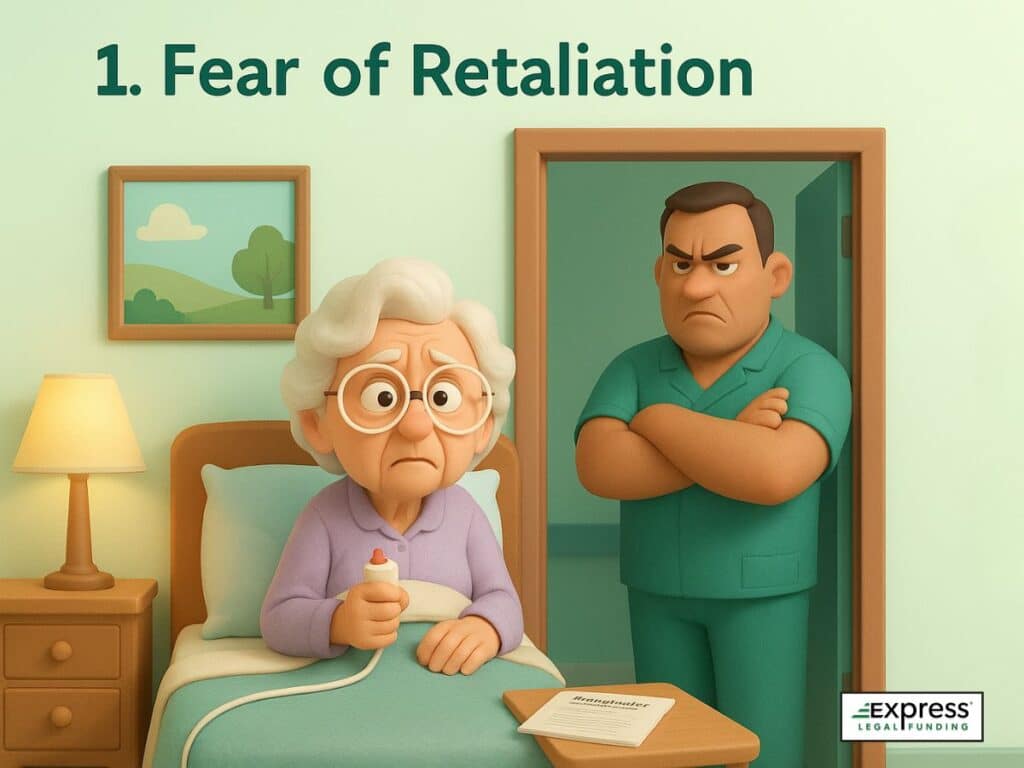
Residents often face threats and intimidation from caregivers, who may warn them of worse treatment or isolation if they speak out. This fear is exacerbated by the residents’ dependence on staff for their basic needs, such as food, medication, and personal care.
The power imbalance between caregivers and residents can create an environment where victims feel trapped and powerless. Similarly, family members are often hesitant to speak out for fear that their loved ones living within the nursing home will be subject to retaliation.
Threats and Intimidation from Caregivers
- Residents who voice concerns may face increased hostility or neglect from staff, leading to a deterioration in their care. This can manifest as verbal abuse, physical neglect, or even punitive measures such as isolation.
- Why Victims Stay Silent:
- The fear of retaliation is deeply rooted in the power dynamics within nursing homes.
- Residents, often frail and dependent, may feel that any complaint could lead to worse treatment.
- This fear is not unfounded; there have been instances where residents who reported abuse were subsequently ignored during meal times or had their care needs deliberately unmet.
Dependence on Staff for Basic Needs
- Fear of losing access to essential services like medication and hygiene can deter residents from speaking out. This dependence creates a situation where residents might endure abuse rather than risk losing the care they rely on for survival.
- Why Victims Stay Silent:
- The reliance on caregivers for daily needs creates a significant barrier to reporting.
- Residents may fear that if they report abuse, they will be left without the necessary support for their health and well-being.
- This fear is compounded by the lack of alternative care options, leaving residents feeling trapped.
Isolation and Limited Family Access
- Limited visitation can prevent family members from observing changes in their loved one’s condition, reducing opportunities to report abuse. This isolation can lead to prolonged periods of unreported abuse.
- Why Victims Stay Silent:
- During times of restricted access, such as the COVID-19 pandemic, families were unable to visit, leading to unreported cases of neglect.
- The inherent lack of oversight from family members can embolden abusive staff, knowing that there is less likelihood of being caught. Even if the family is there often, there are lots of minutes in the day when the family is not there, when abuse can occur.
Case Example: Fear of Retaliation at Florida Nursing Home (2019)
At Memorial Manor in Pembroke Pines, Florida, nursing home residents reported being afraid to speak up about poor treatment due to fear of retaliation from staff. During a 2019 federal investigation, multiple cognitively intact residents described being ignored, spoken to with hostility, and left in soiled conditions for extended periods.
One resident reported waiting over 30 minutes for help after pressing the call light—only for an aide to turn it off and leave. The resident later stated, “I prefer to stay quiet to prevent retaliation.”
The facility was cited under CMS Tag F550, which falls under the federal Resident Rights regulation (42 CFR § 483.10), for failing to protect residents from retaliation when exercising their rights.
2. Cognitive Impairments and Communication Barriers
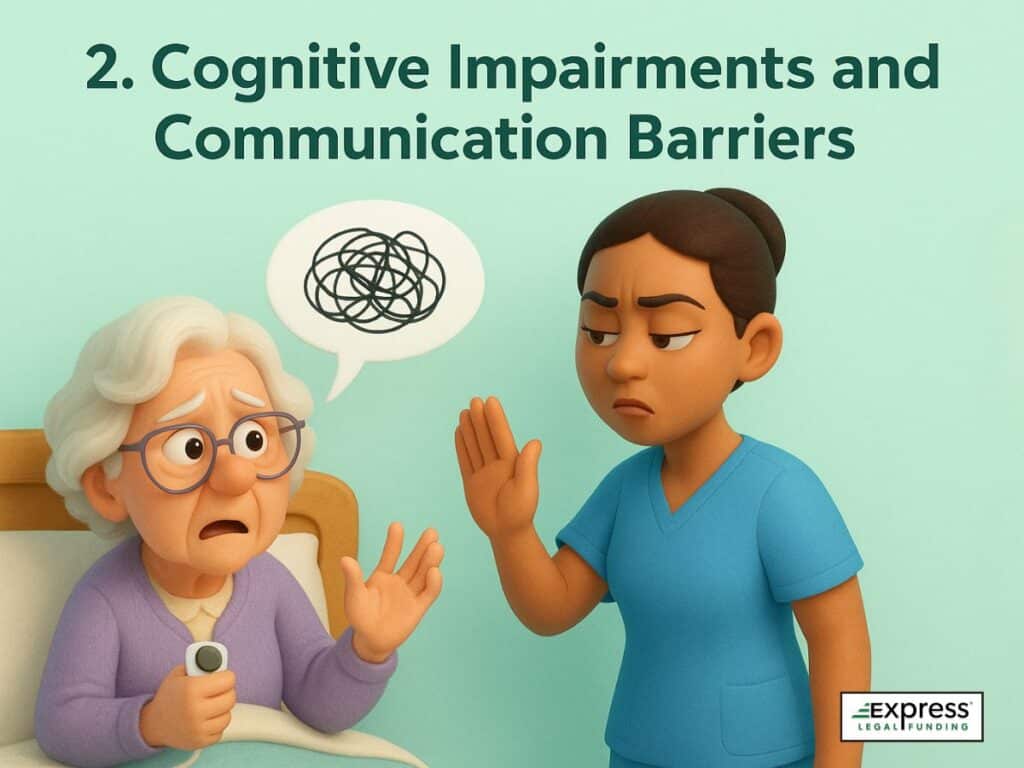
Residents with Alzheimer’s or dementia face significant challenges in reporting abuse, as their complaints are often dismissed as confusion.
Challenges Faced by Residents with Dementia and Alzheimer’s
- Complaints from cognitively impaired residents may be dismissed as confusion, leading to continued abuse. This dismissal can result in a lack of documentation and follow-up on reported incidents.
- Why Victims Stay Silent:
- Residents with cognitive impairments may struggle to articulate their experiences or may not be believed when they do.
- This can lead to a sense of helplessness and resignation, as they feel their voices are not heard or valued.
- A study found that residents with dementia were less likely to have their abuse claims investigated, highlighting the systemic bias against cognitively impaired individuals.
- A 2018 audit of Chicago nursing homes found that 63% of abuse complaints from dementia patients were disregarded because staff assumed they were “hallucinating or confused.”
Dismissal of Complaints Due to Cognitive Decline
- Staff may not take complaints seriously, assuming they are symptoms of cognitive issues rather than genuine concerns. This can result in a lack of intervention and ongoing abuse.
- Why Victims Stay Silent:
- The perception that complaints are merely a result of cognitive decline can discourage residents from reporting abuse.
- They may feel that their concerns will be ignored or ridiculed, leading to a reluctance to speak out.
Case Example: California Nursing Home Caught Drugging Residents (2007)
The California Department of Public Health launched an investigation after a nursing home ombudsman reported that a resident at Kern Valley Hospital was forcibly injected with antipsychotic medication. Investigators found that 22 residents, including patients with Alzheimer’s, had been chemically restrained with high doses of psychotropic drugs not for medical treatment, but to control their behavior for staff convenience.
Some residents became lethargic, suffered slurred speech, body tremors, or sat unresponsive in geri chairs all day. Three residents reportedly died. The state cited the facility with an “immediate jeopardy” violation and referred the case to the Attorney General.
Criminal charges were filed against the Director of Nursing, pharmacist, and medical director for elder abuse resulting in death. One pharmacist later pleaded guilty to a felony conspiracy charge and cooperated with the investigation.
Explore another major California abuse case in our detailed overview of the Maclaren Hall Lawsuit
3. Lack of Awareness and Education
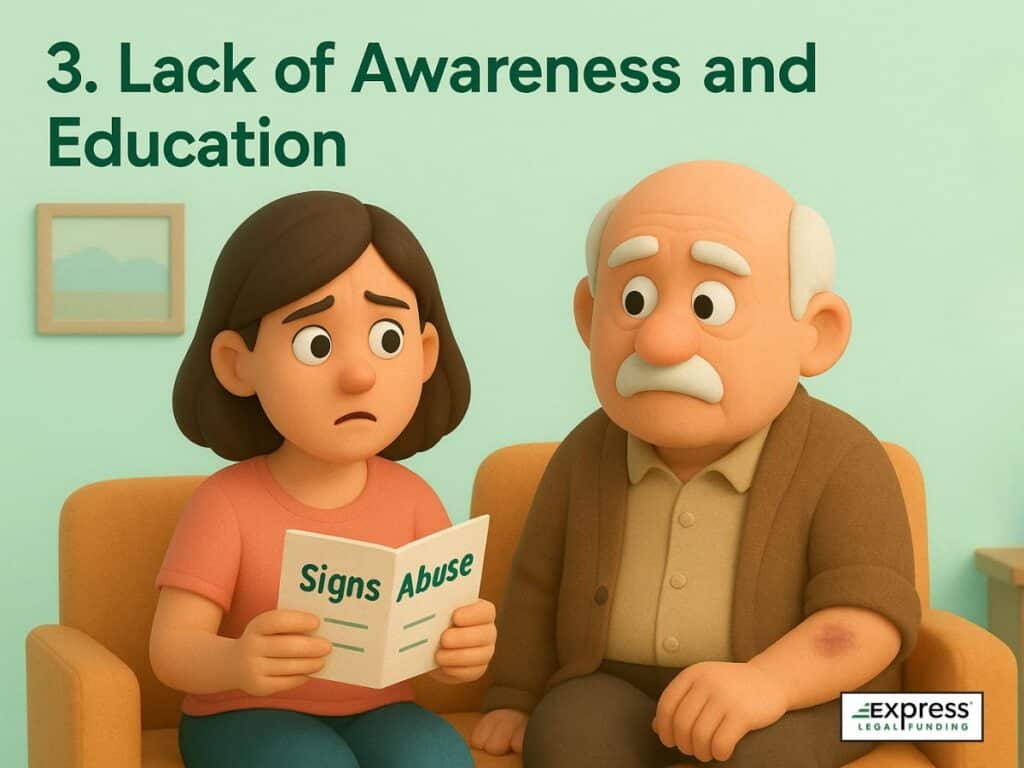
Many families misinterpret abuse signs or are unaware of how to report mistreatment.
Families Misinterpreting Nursing Home Abuse Signs
- Families may attribute bruises or behavioral changes to aging rather than abuse, delaying intervention. This misinterpretation can allow abuse to continue unchecked.
- Why Families Stay Silent:
- Without proper education on recognizing abuse, families may inadvertently allow abuse to persist.
- They may trust the facility’s explanations or believe that their loved one’s condition is a natural part of aging.
Unclear Reporting Procedures
- Confusion about how to report abuse can lead to inaction, allowing abuse to continue unchecked. This can result in prolonged suffering for the victim and potential harm to others.
- Why Families Stay Silent:
- The lack of clear, accessible reporting mechanisms can deter families from taking action.
- They may not know where to start or what steps to take, leading to feelings of frustration and helplessness.
- They fear that complaining will make their family member a target.
Case Example: Minnesota Patient Dies from Malnutrition Due to Home Care Neglect (2023)
In 2023, a Minnesota home health agency was cited for neglect after a patient under their care died from severe malnutrition. The 56-year-old man, who relied on others for his nutritional needs, lost nearly 60 pounds over several months.
According to state investigators, the patient was found “emaciated” and “barely responsive” just days before his death. The caregiver told authorities she was unsure how to prepare his meals and failed to notify nurses or physicians about his declining condition. The Minnesota Department of Health determined the agency had failed to provide essential care and had placed the patient’s health in immediate jeopardy.
4. Institutional Cover-Ups and Lack of Accountability
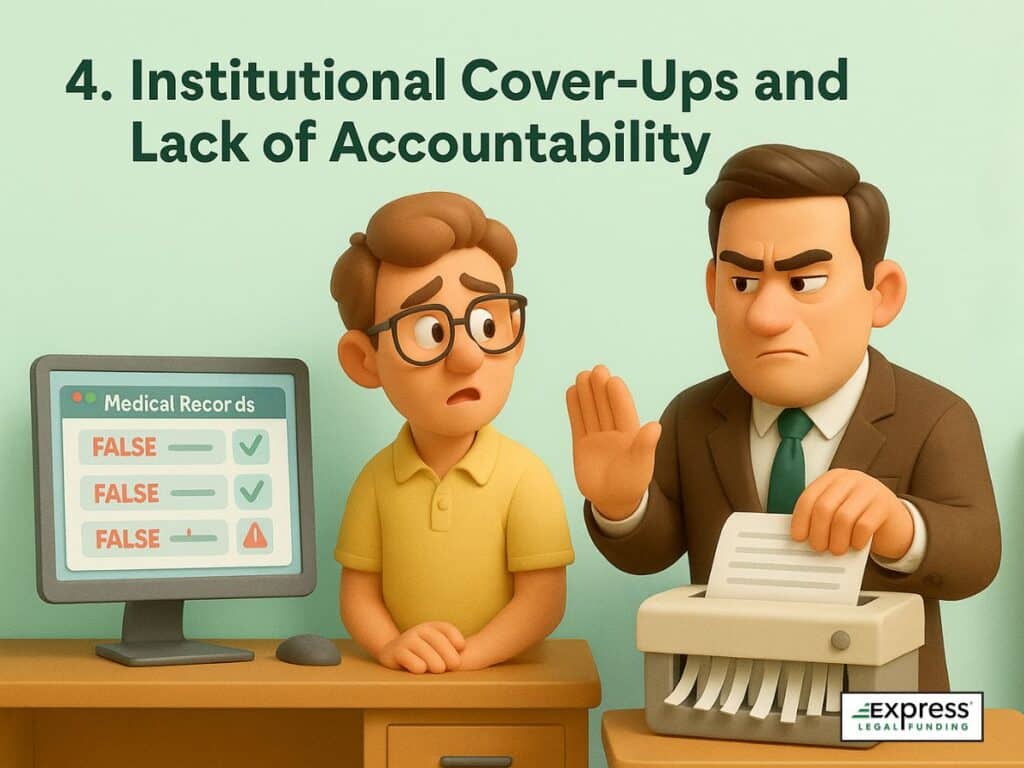
Nursing homes often falsify records, intimidate staff, or obstruct investigations to avoid penalties.
Falsification of Medical Records
- Altered records can hide evidence of abuse, making it difficult for families to prove their claims. This can result in a lack of accountability and continued abuse.
- Why Families Stay Silent:
- Families may feel powerless against institutions that falsify records to cover up abuse.
- The complexity of proving falsified records can deter families from pursuing legal action.
Pressure on Employees to Remain Silent
- Staff may fear job loss or retaliation if they report abuse, leading to a culture of silence. This can perpetuate abusive practices and prevent accountability.
- Why Employees Stay Silent:
- Employees who witness abuse may feel conflicted between their moral duty to report and the risk of losing their livelihood.
- This pressure can lead to a reluctance to speak out, allowing abuse to continue unchecked.
Inadequate Investigations and Regulatory Failures
- Poorly conducted investigations can result in no action being taken, allowing abuse to continue. This can lead to a lack of trust in the system and a sense of futility in reporting.
- Why Victims Stay Silent:
- Families may feel that reporting abuse is pointless if investigations are not thorough or if regulatory bodies fail to hold facilities accountable.
Case Example: New York State’s Underreporting of COVID-19 Nursing Home Deaths
In January 2021, the New York State Attorney General released a report revealing that the state’s Department of Health had undercounted COVID-19 deaths in nursing homes by approximately 50%. The underreporting was attributed to a decision to exclude residents who died in hospitals from the official nursing home death toll.
Further investigations uncovered that top aides to then-Governor Andrew Cuomo had altered a state health department report to omit thousands of deaths, aiming to protect the administration’s image during the pandemic.
This deliberate suppression of data hindered public understanding of the pandemic’s impact on vulnerable nursing home populations and delayed necessary policy responses.
5. Emotional and Psychological Barriers for Families
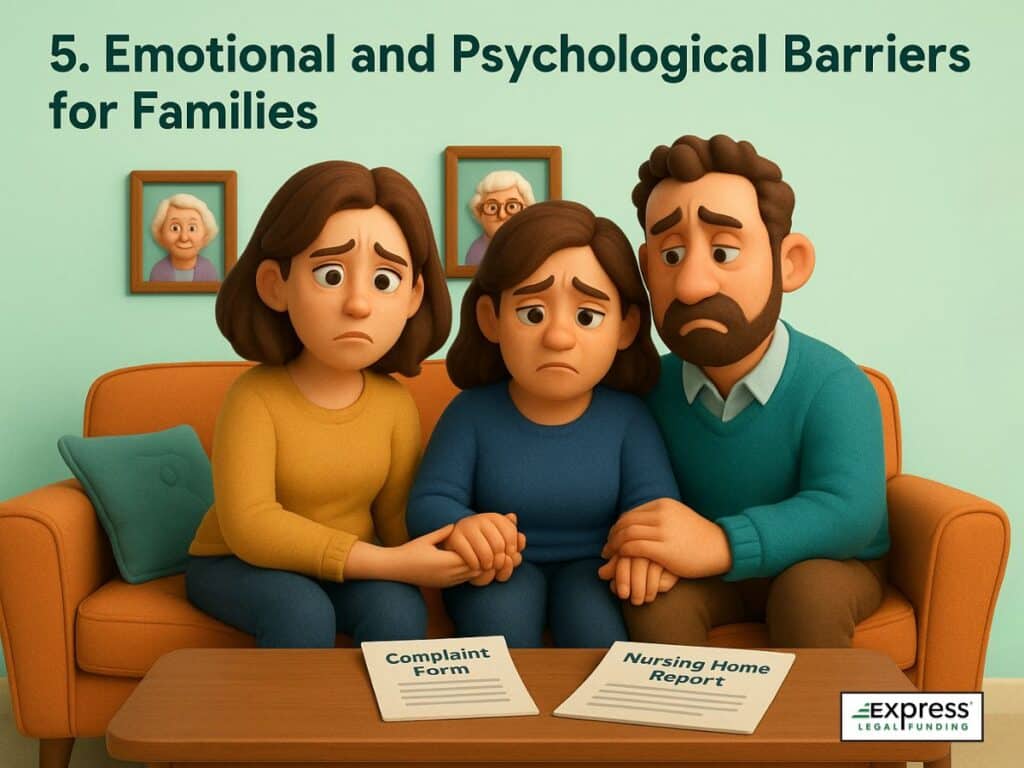
Families often hesitate to report nursing home abuse due to emotional burdens or fear of worsening the situation for the victim.
Guilt Over Placing Loved Ones in a Facility
- Families may feel responsible for the abuse, leading to denial or minimization of the issue. This can delay reporting and intervention, prolonging the victim’s suffering.
- Why Families Stay Silent:
- The emotional burden of guilt can prevent families from acknowledging abuse.
- They may fear that admitting to abuse reflects poorly on their decision to place their loved one in a facility, leading to a reluctance to report.
Fear of Making the Situation Worse
- Concerns that reporting abuse will lead to retaliation against their loved one can deter families from taking action. This can result in continued mistreatment and a lack of accountability for perpetrators.
- Why Families Stay Silent:
- Families may worry that their loved one will face worse treatment if they report abuse.
- This fear can lead to inaction, as families weigh the potential risks of reporting against the current situation.
6. Bureaucratic and Legal Barriers
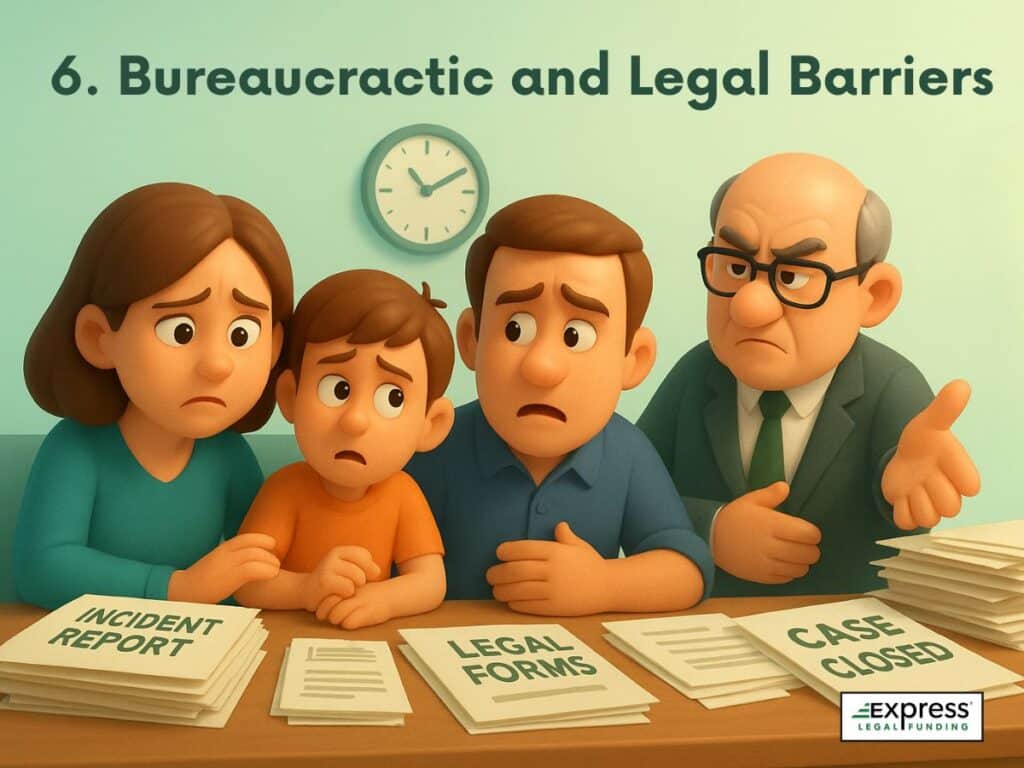
Families often face complex legal procedures when trying to hold nursing home facilities accountable.
Complexity of the Reporting Process
- Navigating the legal and bureaucratic systems can be daunting, leading to delays in reporting. This can result in ongoing abuse and a lack of justice for victims.
- Why Victims Stay Silent:
- The complexity of the reporting process can overwhelm residents and families, many of whom may not know where to start or what steps to take.
- This can lead to feelings of frustration and helplessness, deterring them from pursuing action.
Relevant read: 7 Nursing Home Lawsuit Defense Tactics (How to Beat Them)
Slow Investigations Leading to Continued Abuse
- Consequences: Delays in addressing complaints can allow abuse to persist, causing further harm to residents. This can result in a lack of trust in the system and a sense of futility in reporting.
- Why Families Stay Silent:
- Families may feel that reporting abuse is pointless if investigations are slow and ineffective.
- Moving a family member to another nursing home facility can feel like a daunting effort.
- The lack of timely intervention can lead to continued and even increased suffering for the victim.
Weak Enforcement and Minor Penalties
- Inadequate penalties for facilities found guilty of abuse can fail to deter future incidents. This can result in a lack of meaningful change and continued risk for residents.
- Why Families Stay Silent:
- Families may feel that reporting abuse will not lead to significant consequences for the facility, leading to a sense of futility.
- The perception that facilities can continue operating with minimal repercussions can deter families from taking action.
Case Example: Bureaucratic Failures Prevent Secure Dementia Unit (Pennsylvania, 2024)
In February 2024, 82-year-old Nancy Tyler, a dementia patient, was found dead outside Mt. Assisi Place, a personal care home in Ross Township, Pennsylvania. Her family discovered she was missing from her room, prompting a facility-wide search and a 911 call nearly 30 minutes later. She was found unresponsive on an outdoor bench.
Although Mt. Assisi Place had previously submitted plans in 2023 to create a secured dementia care unit, both the state and county flagged the proposed security system for failing to meet fire safety codes. As a result, the facility opted not to move forward with opening the unit, citing compliance barriers.
The lack of a secure environment contributed to Tyler’s ability to exit the building unnoticed. The medical examiner ruled her death accidental, but the case sparked renewed scrutiny over the regulatory and financial hurdles that prevent long-term care homes from implementing safe, secure dementia units.
7. Cultural and Language Barriers
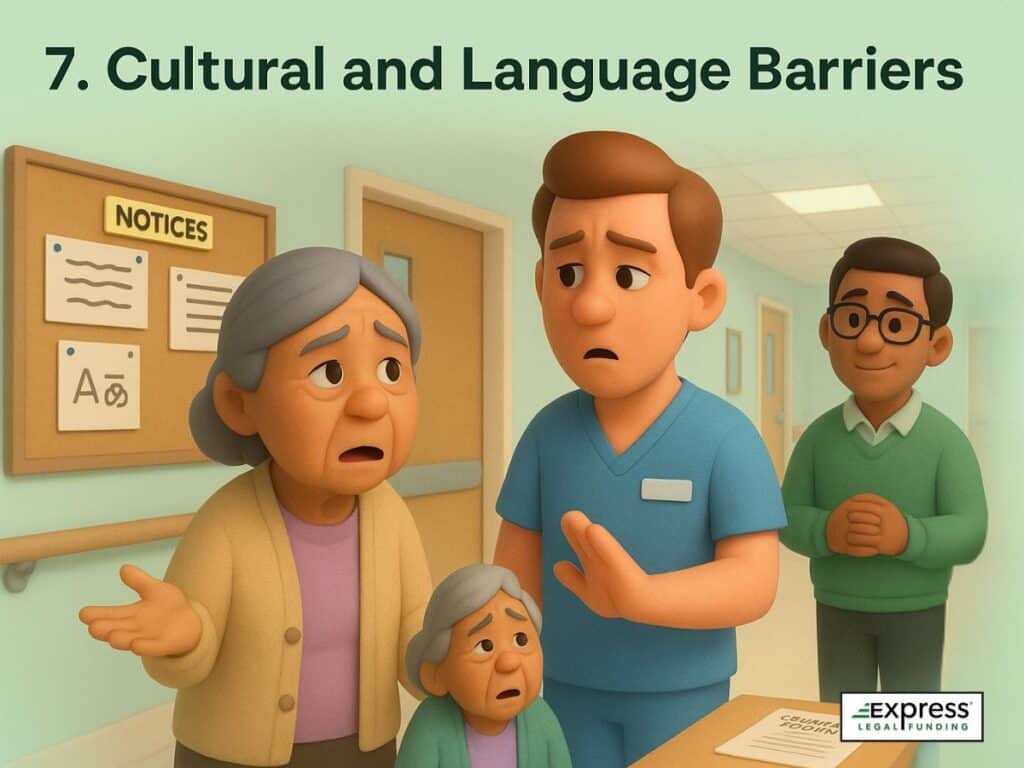
Non-English-speaking residents and those from minority communities face additional hurdles in reporting mistreatment or neglect in nursing homes.
Non-English-Speaking Residents Facing Communication Hurdles
- Language barriers can prevent residents from effectively reporting abuse or understanding their rights. This can result in underreporting and continued mistreatment.
- Why Victims Stay Silent:
- Non-English-speaking residents may struggle to communicate their experiences, leading to a lack of documentation and follow-up on reported incidents.
Cultural Reluctance to Challenge Authority Figures
- Why Victims and Families Stay Silent: Cultural norms and beliefs that discourage questioning authority can lead to underreporting of abuse. This reluctance can lead to a lack of intervention and ongoing abuse by perpetrators.
Case Example: Lawsuit Alleges Discrimination and Reporting Barriers at Korean-Run Facilities in California (2024)
A federal lawsuit alleges that three Los Angeles assisted living facilities—Sunny Hills, Garden Silver Town, and Mugunghwa Silvertown—engaged in discriminatory practices by turning away non-Korean applicants and stating that only Koreans were accepted. Black and white testers were denied tours and told the facilities were “only for Koreans,” while Korean testers were welcomed and offered admission materials.
The lawsuit highlights how language and cultural homogeneity were used not only as admission criteria but also as barriers to inclusion. Such closed environments can discourage outside oversight and make it harder for residents to report mistreatment, raising concerns that exclusionary practices may help conceal abuse or neglect. The plaintiffs are seeking damages and a court order to end the discriminatory admissions.
Summary Table: Key Challenges in Reporting Nursing Home Abuse
| Challenge | Description |
|---|---|
| Fear of Retaliation | Nursing home residents fear worsened treatment if they report abuse. |
| Cognitive Impairments | Conditions like dementia hinder the ability to report or be believed. |
| Lack of Awareness | Families of victims often miss abuse signs or don’t know how to report it. |
| Institutional Cover-Ups | Facilities may falsify records or intimidate staff to avoid accountability. |
| Emotional and Psychological Barriers | Guilt, denial, or fear of conflict prevent families from taking action. |
| Bureaucratic and Legal Obstacles | Complex, slow processes deter families from pursuing complaints. |
| Cultural and Language Barriers | Non-English speakers face communication challenges and cultural stigmas. |
The Consequences of Underreporting Nursing Home Abuse and Neglect
Physical Harm
Underreporting of nursing home abuse can lead to prolonged physical harm for victims. Without intervention, residents may continue to suffer from injuries, malnutrition, and neglect, which can exacerbate existing health conditions and lead to new medical issues. The lack of timely medical attention can result in irreversible damage or even death.
Psychological Harm
The psychological impact of unreported abuse can be profound. Victims may experience anxiety, depression, and a sense of helplessness. The trauma of abuse, coupled with the feeling of being unheard or ignored, can lead to long-term mental health issues. This emotional distress can diminish the quality of life for residents, making their remaining years filled with fear and isolation.
Medical Expenses
Families may face increased financial burdens due to the need for additional medical care resulting from unreported abuse. This can include hospital visits, rehabilitation, and specialized care to address injuries or health complications caused by neglect or mistreatment.
Legal Costs
Pursuing legal action against nursing home facilities can be costly and time-consuming. Families may incur significant expenses in seeking justice for their loved ones, including attorney fees, court costs, and other related expenses. The financial strain can be overwhelming, particularly for families already struggling with the costs of long-term care.
Read more: How Much Does a Lawsuit Cost? Litigation Expenses Guide
Broader Societal Impact
Policy Stagnation
Underreporting contributes to a lack of awareness and data on the prevalence of nursing home abuse, hindering policy reforms. Without accurate reporting, policymakers may underestimate the scope of the problem, leading to insufficient regulations and protections for residents.
Public Health Concerns
The broader societal impact includes public health concerns, as unaddressed abuse can lead to outbreaks of illness or disease within facilities. This can strain healthcare resources and impact the wider community.
Erosion of Trust
Underreporting can erode public trust in nursing home facilities and the healthcare system as a whole. Families may become wary of placing loved ones in care facilities, fearing for their safety and well-being.
Solutions to Improve Reporting and Accountability in Nursing Homes
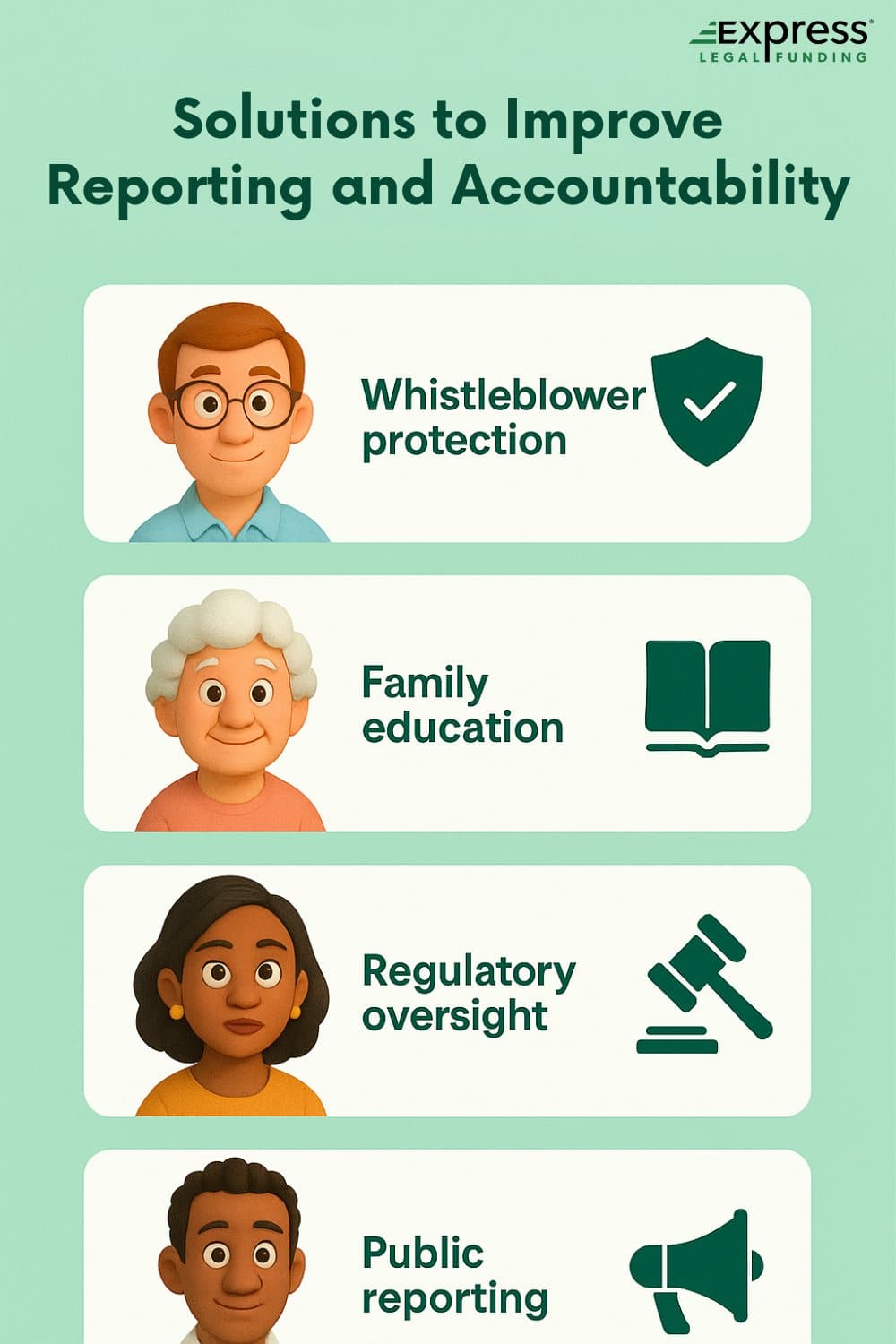
After examining the major challenges in reporting nursing home abuse, it’s clear that reform is essential. Below are key solutions designed to improve reporting efforts, protect victims, and help ensure justice in cases of serious neglect and mistreatment.
Strengthening Protections for Whistleblowers
- Legal Safeguards: Implementing robust legal protections for whistleblowers can encourage nursing home staff and residents to report abuse without fear of retaliation. This includes safeguarding their employment and ensuring anonymity where possible.
- Support Systems: Establishing support systems for whistleblowers, such as counseling and legal assistance, can provide the necessary resources and reassurance for individuals to come forward. This can help create a culture of transparency and accountability within facilities.
Improving Education for Families and Staff
- Training Programs: Comprehensive training programs for staff can help them recognize and prevent abuse, as well as understand the importance of reporting incidents. Regular workshops and seminars can keep staff informed about best practices and legal obligations.
- Family Education: Educating families about the signs of nursing home abuse and the reporting process can empower them to take action when necessary. Providing resources and information sessions can help families feel more confident in advocating for their loved ones.
Enhancing Regulatory Oversight and Penalties
- Stricter Regulations: Strengthening regulatory oversight can ensure that facilities adhere to high standards of care. Regular inspections and audits can help identify and address issues before they escalate.
- Increased Penalties: Implementing harsher penalties for facilities found guilty of abuse can serve as a deterrent and encourage compliance with regulations. This can include substantial fines, revocation of licenses, and criminal charges for severe cases.
- Public Reporting: Making inspection reports and abuse allegations publicly available can increase transparency and accountability. This can help families make informed decisions when choosing a care facility and encourage facilities to maintain high standards.
Helplines and Support Organizations for Nursing Home Abuse Victims and Families
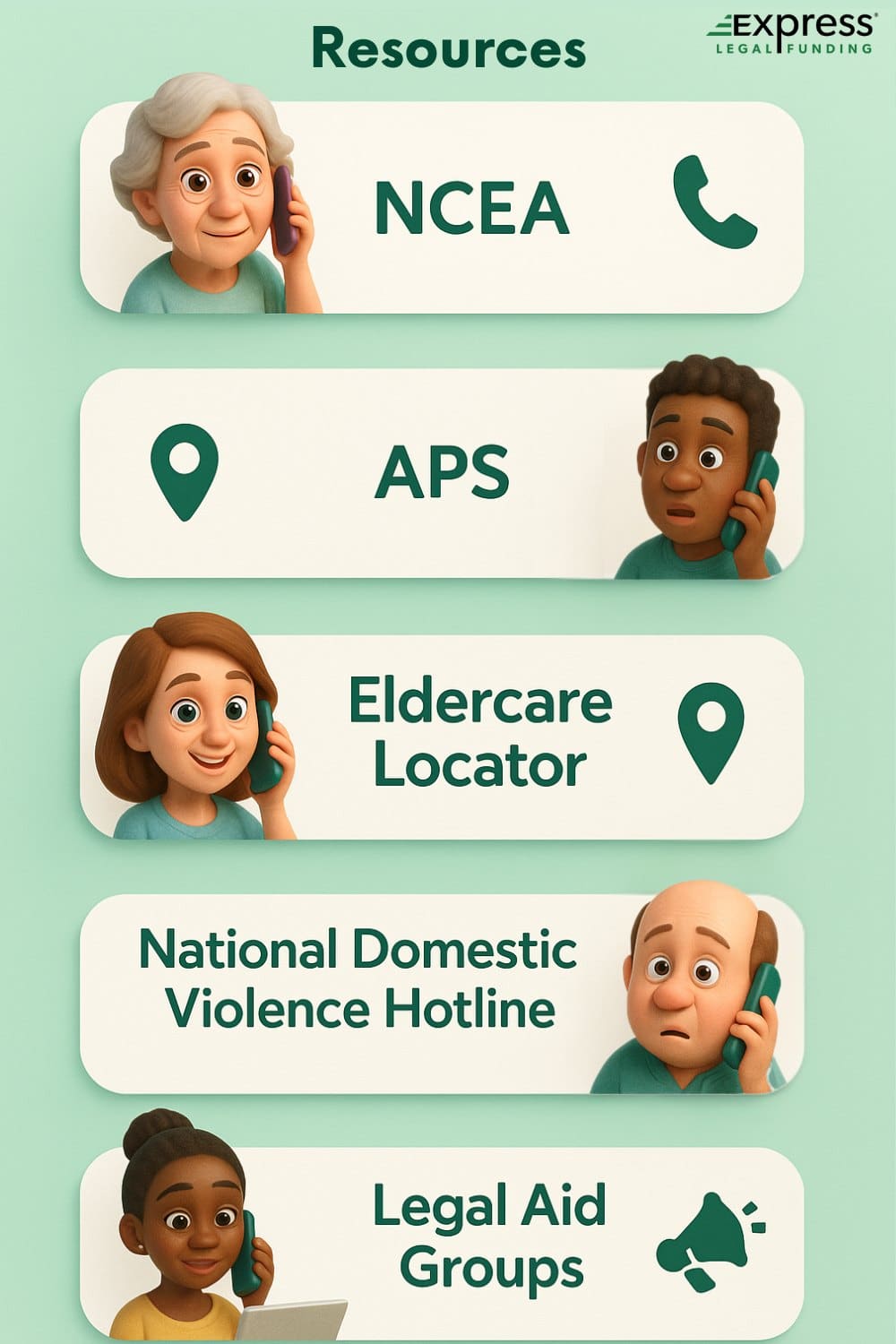
Here are some organizations that can help families and victims of nursing home abuse. These helplines and support organizations offer critical resources for protecting seniors, holding abusers accountable, and ensuring high-quality care in nursing homes across the United States.
National Helplines for Elder Abuse
These hotlines provide immediate support and resources for reporting abuse and seeking assistance.
National Center on Elder Abuse (NCEA)
- Website: ncea.acl.gov
- Purpose: Provide resources, education, and tools to prevent elder abuse. While it doesn’t investigate cases, it directs individuals to the proper authorities.
Adult Protective Services (APS) – State-Specific Hotlines
- Website: napsa-now.org/help-in-your-area/
- Phone: Varies by state (check the website for contact numbers)
- Purpose: Investigates reports of elder abuse, neglect, and financial exploitation. Each state has its own APS agency handling cases locally.
Eldercare Locator (Operated by the U.S. Administration on Aging)
- Phone: 1-800-677-1116
- Website: eldercare.acl.gov/Public/Index.aspx
- Purpose: Connects individuals with local resources, including legal aid, housing, and abuse prevention services.
National Domestic Violence Hotline (for Elder Abuse & Caregiver Neglect Cases)
- Phone: 1-800-799-7233
- Website: thehotline.org
- Purpose: Offers confidential support, counseling, and referrals for victims of abuse, including seniors facing mistreatment in nursing homes.
Legal Assistance and Advocacy Groups
These organizations provide legal aid, advocacy, and education for victims of elder abuse.
National Consumer Voice for Quality Long-Term Care
- Website: theconsumervoice.org
- Purpose: Advocates for nursing home residents’ rights and connects families with resources to report abuse and neglect.
Legal Services for Older Americans
- Website: acl.gov/programs/legal-help/legal-services-elderly-program
Purpose: A network of Older Americans Act-funded legal services that can provide important assistance for older persons in accessing long-term care options and other community-based services.
National Academy of Elder Law Attorneys (NAELA)
- Website: naela.org
- Purpose: Helps individuals find qualified elder law attorneys specializing in abuse, financial fraud, and guardianship issues.
National Association of Nursing Home Attorneys (NANHA)
- Website: nursinghomeabusecenter.com
- Purpose: Provides legal resources for victims of nursing home abuse and their families
- seeking compensation or legal recourse.
Support Organizations and Elder Rights Groups
These groups offer advocacy, support networks, and guidance for families navigating nursing home concerns.
National Long-Term Care Ombudsman Program (LTCOP)
- Website: ltcombudsman.org
- Purpose: Ombudsmen advocate for nursing home residents, investigate complaints, and help resolve abuse or neglect issues.
AARP Fraud Watch Network & Elder Abuse Support
- Website: aarp.org/money/scams-fraud/
- Purpose: Educates seniors and families about financial abuse, scams, and mistreatment in long-term care settings.
National Council on Aging (NCOA): Elder Justice Initiative
- Website: ncoa.org
- Purpose: Provides educational resources and programs to prevent elder abuse and ensure quality care for seniors.
Justice in Aging: Elder Justice Program
- Website: justiceinaging.org
- Purpose: Works to end elder abuse by influencing policy changes and offering legal advocacy for seniors facing neglect or mistreatment.
Additional Resources for Families
Families of nursing home residents often need guidance on legal options, reporting abuse, and ensuring proper care.
Nursing Home Compare (Medicare.gov)
- Website: medicare.gov/care-compare/
- Purpose: Allows families to research and compare nursing home ratings, inspection reports, and violations.
American Bar Association: Commission on Law & Aging
- Website: americanbar.org/groups/law_aging/
- Purpose: Offers resources on legal rights, guardianship, and advance care planning for older adults.
Better Business Bureau (BBB) Nursing Home Complaints
- Website: bbb.org
- Purpose: Provides consumer reviews and complaint resolution services for families dealing with substandard nursing home care.
Conclusion: Overcoming the Challenges of Reporting Nursing Home Abuse
Reporting nursing home abuse isn’t just about protecting a single resident—it’s about challenging the systems that allow mistreatment to go unchecked. As we’ve explored, the barriers to speaking out are real and deeply rooted, from fear of retaliation to institutional cover-ups and cultural silence. However, by understanding these challenges, we can begin to dismantle them.
Whether you’re a family member noticing signs of abuse, a caregiver unsure of what to do, or a whistleblower afraid of the consequences, know that you’re not alone. Raising your voice can help prevent further harm and hold negligent facilities accountable.
Justice for nursing home abuse victims starts with speaking up—and sometimes, it also requires financial support to keep fighting.
Need Help Covering Expenses During a Nursing Home Abuse Lawsuit?
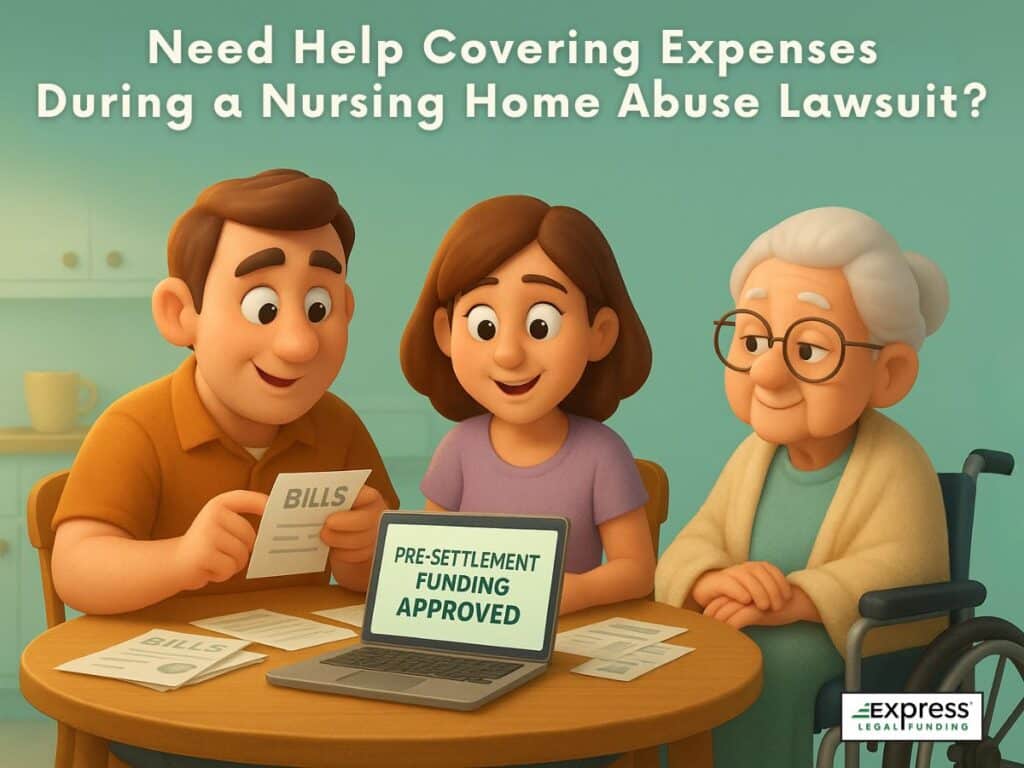
Express Legal Funding provides fast and risk-free pre-settlement funding for families pursuing nursing home abuse and neglect claims. If your loved one has suffered and you’re in the middle of a legal battle, we can help you access money now to pay for essentials like housing, medical care, and transportation, without waiting for the case to settle.
Need Cash While Waiting on a Settlement?
Key highlights of pre-settlement funding include:
- No win? No repayment.
- No credit checks or income requirements.
- Use the funds for any immediate expenses.
Don’t let financial stress stop you from seeking justice.
🟢 Apply today with Express Legal Funding and get the financial support you need to stand up for your loved one’s rights.
FAQ: Common Challenges in Reporting Nursing Home Abuse
What are the common reasons nursing home abuse goes unreported?
Nursing home abuse often goes unreported due to fear of retaliation, cognitive impairments, lack of awareness, and legal or cultural barriers. Victims may feel powerless, and families may hesitate to speak out, especially if they’re unsure about the signs or reporting process.
How do cognitive impairments like dementia affect the reporting of nursing home abuse?
Residents with dementia or Alzheimer’s often have difficulty articulating abuse or identifying perpetrators. Even when they report mistreatment, their complaints may be dismissed as confusion or memory loss. This leads to fewer investigations and a higher risk of ongoing abuse being overlooked or unaddressed.
What role does fear of retaliation play in underreporting nursing home abuse?
Fear of retaliation is a major reason abuse goes unreported in nursing homes. Residents may worry about being neglected, isolated, or mistreated further. Families also hesitate, fearing their loved one will suffer if they speak up.
Are families legally responsible for not reporting suspected abuse?
Families are generally not legally obligated to report suspected nursing home abuse unless they hold a specific role defined under state mandatory reporting laws (such as legal guardianship or professional caregiving). However, some states do encourage or require certain family members to report abuse if they are in a position of responsibility.
Ethically, reporting suspected abuse can help prevent further harm and protect other vulnerable residents.
What should you do if a nursing home tries to cover up abuse?
Some nursing homes may attempt to hide abuse by falsifying medical records, intimidating staff, or interfering with investigations. If you suspect a cover-up, document all signs of mistreatment, take photos if possible, request medical and care records, and report the situation to your state’s Adult Protective Services (APS) or a long-term care ombudsman for further investigation.
How do language and cultural barriers affect nursing home abuse reporting?
Language barriers can prevent non-English-speaking residents from reporting abuse or understanding their rights. Without interpreters, complaints may go unheard. Cultural stigma—especially in traditional or close-knit communities—may discourage both residents and families from speaking out, fearing shame, dishonor, or distrust of authorities.



